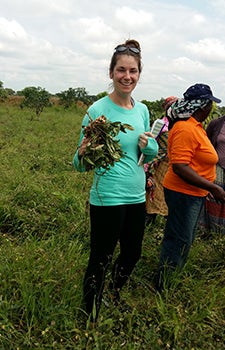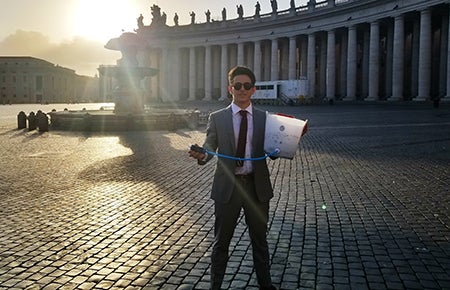
Sustainability contest teaches students how to succeed in environmental business
Since being named a finalist in the USC Wrigley Sustainability Prize competition last spring, Holly Tassi’s young company is finishing development of its first product — snack chips made from a sustainable African nut. They’ll be on the market later this year.
Another finalist, Kevin Kassel, recently received $100,000 in early funding to help change the way people access clean water. His company will soon have vending machines in drought stricken areas of sub-Saharan Africa that will disperse water for a quarter of the price it costs elsewhere.
And Noah Snyder, the head of Interphase Materials — the team that won last year’s competition — just received a $750,000 grant from the U.S. Department of Energy to support his fledgling company’s work to improve the efficiency of power plants. The company has a second contract with the U.S. Navy and is working on a project in Canada, deploying their technology on a turbo generator power plant.
All three entrepreneurs credit their participation in the first USC Wrigley Sustainability Prize, an entrepreneurial competition supporting environmental ideas with market potential, as a key factor in their success. The deadline to enter the 2018 competition, open to people throughout the USC community, is Jan. 29.

“One of the benefits I never expected was the mentoring,” said Tassi, a USC Marshall School of Business graduate student and the founder of Believe in Bambara. “My mentor met with me four or five times before the final competition and really helped me refine my pitch. That also helped to improve my confidence.”
The mission of Tassi’s company is to combat global hunger while providing economic relief to financially distressed Africans through the cultivation of bambara, a highly nutritious nut that thrives in the sandy soils of west Africa. Winnings from last year’s competition were used to purchase her first crop of the nut, the main ingredient in all the products she plans to produce, which include pasta, milk and yogurt.
Kassel, who founded Aqus to change the way people access clean water and to eliminate the need to boil it or purchase it in a bottle, says the insight he gained from competing in the Wrigley Prize supported his victory in an even bigger, international competition for entrepreneurs late last year.
Aqus was one of just nine startups, selected from about 300, to receive $100,000 in equity investments — and coaching from Silicon Valley professionals — through the Vatican-sponsored Laudato Si Challenge, a new global initiative to find, fund and incubate companies that are solving the world’s biggest problems.
“Getting the awesome insight and feedback on our business model and strategy — from such an incredible group of people — was a rare opportunity,” says Kassel, who has a bachelor’s degree in environmental studies from USC Dornsife and will earn a bachelor’s degree in business administration from the USC Marshall School of Business this spring.
By participating in the Wrigley Prize, he said “our business model grew and evolved and we learned the most important points to communicate to investors, partners and clients.”
Kassel said that in addition to producing inexpensive, easy-to-use water filters, Aqus will now make water available and affordable through vending machines in African countries, beginning with Uganda before expanding to Kenya and nearby countries in the east.

Rewarding environmental entrepreneurship
Chase Puentes, program assistant for the USC Wrigley Institute for Environmental Studies, says she’s proud of the success experienced by so many who competed in the first Wrigley Sustainability Prize.
“We launched the competition to support the institute’s goal to not only deepen understanding of our environment, but to develop practical solutions for preserving it,” Puentes said. “So we’re incredibly proud and grateful to hear stories of success — less than a year later — from students in programs throughout the university.”
All entrants to the competition receive support developing a professional business plan, networking opportunities, and coaching by mentors with Blackstone LaunchPad USC, to develop their pitch to potential investors. Semifinalists receive a free trip to the USC Wrigley Marine Science Center on Catalina Island off Los Angeles’ coast and more intensive coaching to help launch their entrepreneurial idea into a business.
This year’s competition, just as in 2017, will culminate with a panel of judges awarding $15,000 in prize money, split among the top three finalists.
Snyder, part of the team that received top honors last year, says the prize money was helpful, but the biggest reward was the validation of Interphase Material’s technology, anontoxic, anti-biofouling surface treatment for piping that, among other benefits, increases power plant efficiency. It was successfully tested at the USC Wrigley Marine Science Center after the team’s victory.
“As a new and small company, it’s tough to establish credibility,” said Snyder. “Having a stamp of approval from USC, particularly the Wrigley team, has been very valuable to us.”
See the USC Wrigley Institute’s website for more information about the sustainability prize competition.